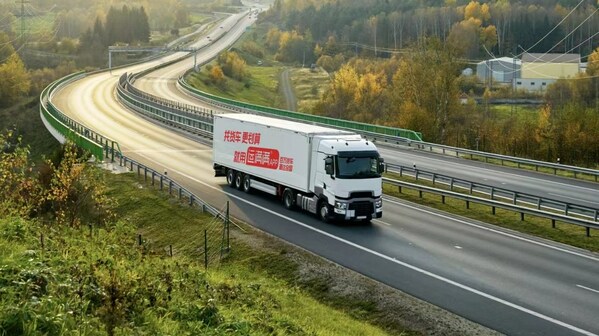BEIJING, Dec. 12, 2023 /PRNewswire/ -- Full Truck Alliance (NYSE: YMM), a leading digital freight platform in China, published the Industrial Clusters Report of Digital Logistics on December 7, sharing its insights on the evolution of logistics industry from the perspective of digital logistics for the first time.
The report aims to help SMEs discover more business opportunities, as well as provide industry insights on cargo trends to drivers, enabling them to more efficiently take orders and serve consignors.
The report highlights that China's digital logistics penetration rate has seen double-digit growth annually in recent years, with inland areas witnessing a 27% and more developed coastal regions a 15% growth rate over the past year. Overall, the development of industrial clusters of digital logistics in China features stair-stepped growth patterns, and industry clusters in different provinces show different characteristics.
The report also notes a 4% reduction in the average transportation distance for digital logistics orders nationwide during the past year, while within most industrial clusters, this distance has shortened by up to 10%, signaling faster regional economic integration.
Meanwhile, the report uncovers economic shifts within regions, such as the replacement of eight of the top ten consignors in Qingdao's top industries, transitioning mostly from agriculture to manufacturing within a year.
At the report release conference held in Beijing, Full Truck Alliance also held panel discussions together with executives and experts from the logistics industry, to explore how to comprehensively improve the efficiency of logistics to benefit the broader society, better serve the logistic needs for various industries and support the development of economy.
At the conference, Wang Yuchen, General Manager of Cold-Chain Logistics at Full Truck Alliance, noted that digitalized methods can better track the fluctuation of supply and demand of cargos and trucks dynamically, better balance the fluctuation, and significantly reduce transportation costs. In addition, with its disintermediation nature, digital logistics platform can reduce repeated price increases in traditional logistics chains, improve the transparency of business operation, and help businesses reduce their comprehensive logistic costs by as much as more than 10%.
"After fully embracing digital logistics, our logistics costs have decreased by 30%, and efficiency has increased by 60%," echoed Jiang Hao, General Manager of Shanghai Yihuang Wood Industry Co., Ltd. "Additionally, our warehousing turnover has improved by 20%, contributing to a 10% cost reduction."
He Zhilin, founder of Guangdong Chuanwei Dongpin, believes that digitalization can effectively improve turnover efficiency and reduce operating costs of logistics. "Chuanwei has started its digital transformation in business management, operation and logistics since 2020. Thanks to the digitalization, Chuanwei's CAGR for its earnings has grown by 100%, with its revenue reaching a record of 6 billion in 2023."
As industry leaders emphasize, digital logistics platforms are more than just technological advancements; they are a catalyst for cost savings and increased efficiency across various sectors. According to Zhou Zhicheng, director of the research institute of China Federation of Logistics and Purchasing and secretary-general of its Sub Committee of Freight Industry, digital freight platforms are able to explore more industrial use cases, and provide digital tools and solutions to help businesses reduce costs and increase efficiency.
With over a decade of innovation, Full Truck Alliance now services over 300 cities and more than 100,000 logistic routes, links 3.79 million active drivers with over 2 million consignors monthly, and enhances logistics efficiency through intelligent cargo-truck matching and streamlined online transactions. This not only helps businesses reach freight capacities easily and brings SMEs flexible and diverse shipping solutions, but also allows businesses to integrate and manage complex transport resources including trucks and drivers, so as to improve the efficiency of various industries and expand their business operations.
 1 year ago
477
1 year ago
477 






 English (United States)
English (United States)